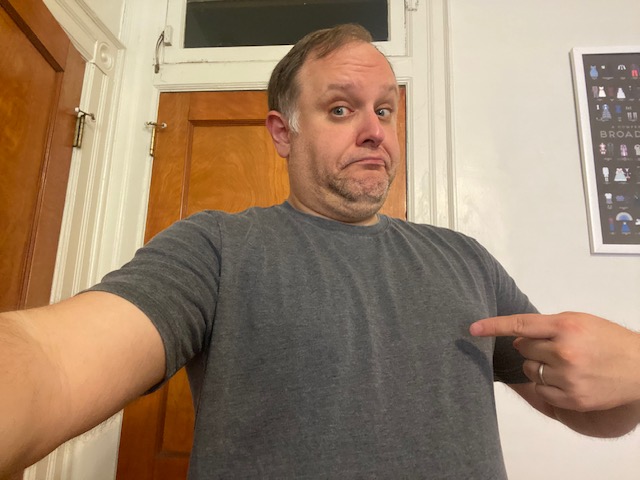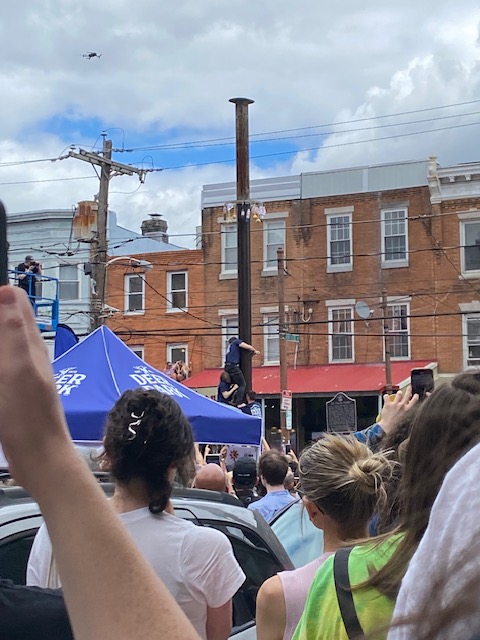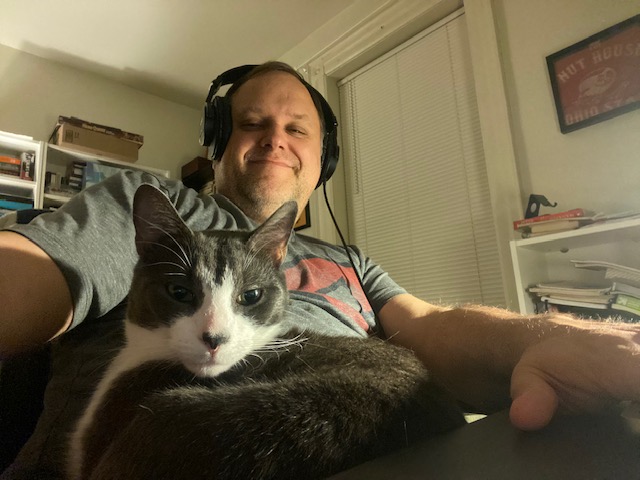This past Saturday, my wife and I returned to the King of Prussia Mall, and somehow, we survived. Frankly, it was a much better experience than usual, which isn’t all that hard, I suppose, considering the loathing I bear towards KoP. The difference? We came in with a plan, an agenda, and we pursued that agenda with ruthless eff—well, not efficiency, but certainly tenacity. Rather than racing throughout the mall, trying to hit all the stores that might have what we need or want, we focused on areas that had the highest density of stores pertinent to us, and planned a path that took us from one to the other with as little distraction as possible. For eight hours.
A margarita at lunch also helped.
For my wife, the goal was finding clothes for work. Before the pandemic, shopping was always a challenge for my wife, as sleeves and pant lengths were designed for the shortest among us rather than, like, normal-shaped people. After the pandemic, things got downright desperate. Brands leaned hard into the work-from-home aesthetic, meaning work clothes were replaced with athleisure, leaving the professionals among us* with few options indeed. Now, though, with more and more people returning to the workplace, stores are once again stocking up on clothes better suited for a professional setting.
* When I say “among us,” of course, I mean the royal “us,” because while I am many things, professional is probably not one of them.
You may remember some weeks ago when I wrote about trying to buy better clothes, and how I was struggling to know what “better” actually meant as it pertained to me. As of last weekend, I…still don’t know exactly what that means. I do know I seem to have more expensive tastes, although I wouldn’t call them fancy. Of all the stores I’ve walked into over the last two months, the one I liked the best was Theory, with their $300 sweaters and $175 polos. What did I like about it? Clean lines, simple patterns and fabrics, and an all-around cultivated look of being both put together and at ease.
I did not buy anything from Theory, nor from Brooks Brothers, Banana Republic, Nordstrom’s, or almost any of the other stores we visited. What I was looking for was simple: t-shirts, something that fit a little closer than the generic tees I’ve been sporting for the past forty years, with a snug fit around the arms and a little flow to give my gut room to breathe. I tried on t-shirts at all of these stores, and it wasn’t until we hit Lucky, at the end of our day, that I found what I wanted.

If this seems like a lot of time to write about clothes shopping, then you’re right. That’s because this post isn’t about clothes. It’s about trying to decide who I want to be going forward.
Just like last week, when I wrote about my existential concerns regarding this blog, this weekend’s shopping trip was a chance for me to ask myself what I wanted my clothes to look like going forward. Clothes make the man, or so they say, and I was interested in finally giving that thought a bit more of my time.
Even so, I found myself struggling with feelings of superficiality, a persistent voice in my head telling me that to find value in clothes beyond cost was vanity. I suspect this voice is borne from a childhood that, while far from want, was spent in the company of people far more well-off. Dublin was a diverse community, if you consider diverse to mean rich, moderately rich, and comfortably middle-class. In that setting, we were definitely near the bottom end of the spectrum, and while it never truly bothered me, I assumed some beliefs that reflected my position, one that valued thrift and a cheap cunning over flashy expenditure and consumerist compliance.
And here’s an example of the problem I find myself facing, as I look back on these past 42 years: for the most part, I’ve spent most of my life defining myself not by what I am, but by what I am desperate not to be.
It’s so much easier to say no to something than to say yes.* Saying no denies responsibility. Saying no removes the burden of effort. Saying no relieves you, however momentarily, of having to define an alternative. And it’s far easier to unite people along lines of “no” than along the many gradations of “yes.” Just look at our current political climate, where conservatives, whose first answer to any question is “no,” are far more united than the various factions within liberal politics, who all want to say yes, but to different things, and in different ways.
* I say this knowing full well that I’ve also had times when it was far too hard to say no. There are many people out there who struggle with this same issue, and who are presented with requests on a regular basis that they find difficult to refuse. It might start with a bake sale, but before you know it you’re running the PTA, all while shuttling kids to practice and lessons and a host of other obligations. Me saying “no” is easier than “yes” is not meant for these moments. Trust me, I feel you.
For me, this feeling has often manifested as “I don’t wanna be that guy” statements. I see a total bro, taking up space and making his desires the most important thing in the room, and I think, “I don’t wanna be that guy.” I see people whose creative juices are stifled by their work, who find themselves in the office all hours of the day, without the time to write or play or sing or paint. I don’t wanna be that guy. I see people state proudly their beliefs that women belong at home, and that men have a duty to defend their homes and their ideals, preferably at the point of a gun, and I think I definitely don’t want to be that guy.
But then…what kind of guy do I actually want to be?
I’ve been lucky enough to have had a relatively varied life, one that’s taken me places I never imagined possible. Growing up in Dublin, I always assumed that no matter what, I’d end up back in my hometown. Even when I struck out for Missouri to earn my PhD, I assumed I’d end up back in Ohio sometime, and take my place back with the people of my youth.
But then I went to New York, and lived what felt like a completely different life, and I loved it. I worked in Important Theatres, building sets for Important Works, all while feeling Very Important myself, whether I was supervising welders or rolling dumpsters in the alley. Then Baltimore, where I led a shop of young and hungry carpenters and worked with a team of dedicated but also super-cool supervisors, all focused on putting the best work possible on our stages. Even Baltimore itself started to feel like home. And now Philadelphia, our third East Coast stop, and while it’s taken a while to start feeling comfortable here, it still resonates, and I find myself growing more and more within this place, picking up the pace of my adaptation.
But even with that…what’s next? Remember Mike? “What’s the endgame,” he asked. And still, a decade after he asked that question, I don’t rightly know.
On Sunday, we went to Philadelphia’s Italian Festival. It was our second year attending, and so we had more of an idea what to expect. We caught the tail end of the procession of the saints, then grabbed some meatballs and a cannoli and settled into a spot to watch a bunch of dudes try to climb a greased pole in pursuit of meats and cheeses. Needless to say, it was great.

But as we were standing in the crowd, watching those men struggle and ultimately fail to scale that pole, I found myself noticing other men in the crowd. So many of the guys at that festival looked so…sure of themselves. They looked secure in who they were, confident in their pursuit of what they apparently knew they wanted, whether it was beer or a path through the crowd as they made their way deeper into the festival. Was this confidence something they really felt? Or are they just that good at putting on a show?
Sometimes I feel like I’m watching the world from outside myself, almost like I’m watching myself watch myself. On that day, for instance, I found myself both physically moving through the crowd while also wondering what other people felt as they wended their way amidst the mass of bodies. How do they see me as I make my way past them? Do they see me at all? And if they don’t, should I be concerned? Do I see them? Why should I even care? Do I care? Or is it just idle wondering as the crowd slowly pulses forward?
I think these feelings, this desire to define myself in some way, is part of why I’ve been working out so much more these past several months. It’s something I can control, a tangible fact that requires me to physically move objects or myself in a defined pattern, with results that are measurable. That’s probably why joining the gym by my mom’s house was so important while I was marooned in Florida.
In this ongoing effort to define who I am, the physical work is me literally reshaping my body. I am taking control of this body that I have shaped mostly through neglect and sometimes outright mistreatment, and trying to force it into a mold that I am constantly redefining based on goals and expectations. It is relatively low-stakes, beyond the desire to improve my longevity, although as time goes on, those stakes have risen as part of my overall wellbeing. In essence, I want to see what I can transform myself into, as a sign of both my discipline and control as well as a reflection of my potential.
After all, if I can successfully build my body into something I’m proud of, if I can coordinate the effort and the dedication and the essential refusal to settle back into familiar, more comfortable patterns, then why can’t I apply that lesson to other areas of my life.
This was a question my therapist asked. Well, she didn’t ask it exactly. She started to ask it, but as an extremely garrulous patient, I cut her off and asked it myself, thanks to my anxiety and my desperation to show just how smart and self-aware I am. In any case, it’s a fair question. If I can show persistence in this effort, in a way that has eluded me for the vast majority of my life, then why can’t I implement the same thought patterns for other areas of my life?
It’s not that easy, of course. Lifting a weight is a simple, relatively thoughtless activity, one that has a clear beginning and end, and that can be easily measured in both the micro and macro sense. Things like writing and music and other pursuits aren’t so easily compartmentalized. But the point still stands. While the things I’ve been doing to transform my body are discrete and measurable, the mindset that makes those workouts effective is one of practice. Lifting weights once or twice, or even over the course of weeks and months, is not in itself going to transform your body. You have to make it a practice, part of your routine, something you do not for the immediate result, but for the bigger picture, and so far that’s been working for me.
Writing, too, is a practice, as is most creative work. We only see the end result of the artist, a fact that obscures the true labor that goes into building not only the work we see, but also the work that never sees the light of day. We don’t see the hundreds of thousands of words that feel beautiful when we write them, but that don’t fit the end product. Authors kill their babies, artists paint over budding masterpieces, and directors leave beautiful moments on the cutting room floor.
The only thing that makes this kind of work palatable—heck, that makes it work and not flailing—is practice. Being a writer isn’t about stringing a few words together and hoping to get lucky. It’s putting endless words together time and time again, day after thankless day, in the effort to find the right combination for what you’re trying to say. Writers sculpt their vision from the countless words in any language, carving away the combinations that don’t work, leaving only the “right” words—and even then, not everyone sees the same thing.
All of this, believe it or not, because I was looking for t-shirts.
I bought two.
